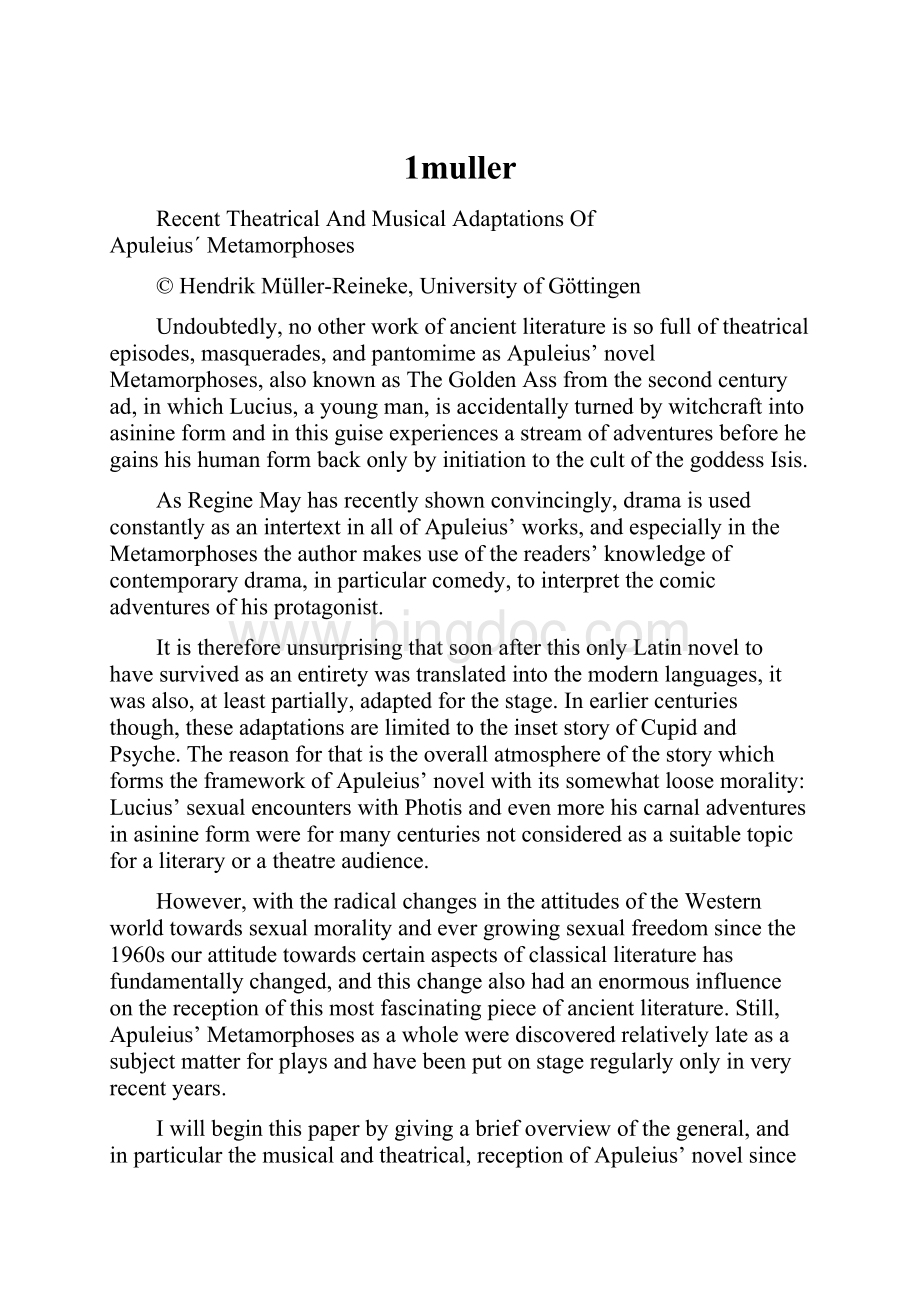1muller.docx
《1muller.docx》由会员分享,可在线阅读,更多相关《1muller.docx(24页珍藏版)》请在冰点文库上搜索。

1muller
RecentTheatricalAndMusicalAdaptationsOf
Apuleius´Metamorphoses
©HendrikMüller-Reineke,UniversityofGöttingen
Undoubtedly,nootherworkofancientliteratureissofulloftheatricalepisodes,masquerades,andpantomimeasApuleius’novelMetamorphoses,alsoknownasTheGoldenAssfromthesecondcenturyad,inwhichLucius,ayoungman,isaccidentallyturnedbywitchcraftintoasinineformandinthisguiseexperiencesastreamofadventuresbeforehegainshishumanformbackonlybyinitiationtothecultofthegoddessIsis.
AsRegineMayhasrecentlyshownconvincingly,dramaisusedconstantlyasanintertextinallofApuleius’works,andespeciallyintheMetamorphosestheauthormakesuseofthereaders’knowledgeofcontemporarydrama,inparticularcomedy,tointerpretthecomicadventuresofhisprotagonist.
ItisthereforeunsurprisingthatsoonafterthisonlyLatinnoveltohavesurvivedasanentiretywastranslatedintothemodernlanguages,itwasalso,atleastpartially,adaptedforthestage.Inearliercenturiesthough,theseadaptationsarelimitedtotheinsetstoryofCupidandPsyche.ThereasonforthatistheoverallatmosphereofthestorywhichformstheframeworkofApuleius’novelwithitssomewhatloosemorality:
Lucius’sexualencounterswithPhotisandevenmorehiscarnaladventuresinasinineformwereformanycenturiesnotconsideredasasuitabletopicforaliteraryoratheatreaudience.
However,withtheradicalchangesintheattitudesoftheWesternworldtowardssexualmoralityandevergrowingsexualfreedomsincethe1960sourattitudetowardscertainaspectsofclassicalliteraturehasfundamentallychanged,andthischangealsohadanenormousinfluenceonthereceptionofthismostfascinatingpieceofancientliterature.Still,Apuleius’Metamorphosesasawholewerediscoveredrelativelylateasasubjectmatterforplaysandhavebeenputonstageregularlyonlyinveryrecentyears.
Iwillbeginthispaperbygivingabriefoverviewofthegeneral,andinparticularthemusicalandtheatrical,receptionofApuleius’novelsincetheRenaissance.ThissummaryprovestheassumptionthatstageadaptationsofApuleius’novelforcenturiesmoreorlessmeanadaptationsofthetaleofCupidandPsyche.Althoughmostofmyobservationsarebasedonalreadyexistingresearchandarethereforefarfromoriginal,Ihopeatleasttocombinesomeloosestrands,asinmanycasesthedataavailablesofarexistsonlyintheformofhandbookentries.ButasmymainfocusinthispaperisclearlyaimedatmorerecentadaptationsoftheMetamorphoses,IcanonlytreatmostoftheseadaptationsfromtheRenaissancetothetwentiethcenturyverybriefly,andfurthermoreIwilllookatthingswithacentralEuropeanperspective.Moreimportantforthesakeofmyconclusionistheimpressionoftheoveralldevelopment,andthereadershouldmostimportantlynoticetheevergrowingmassofproductionsofCupidandPsychestageversions,manyaccompaniedbymusic,fromthesixteenthcenturyonwards.
InthesecondpartIwillconcentrateonthegrowingnumberofproductionsoftheMetamorphosesattheendofthetwentiethandthebeginningofthetwentyfirstcentury,someofthemstillbasedontheinsettaleofCupidandPsyche,butothersconstitutingaclearlygrowingnumberofadaptationsfocusingondifferentaspectsofthenovel.Thereader’sattentionisespeciallydrawntosomeoftheverylatestadaptationsoverthelastdecade,someofthemquitealientotheoriginal.Withtheseproductionsthispaperattainsafarmoreglobalperspective,bothintermsoftheircountryoforiginandtheiraffiliationwithdifferentgenres.Mostoftheveryrecentadaptationsarenot(yet)availableorareevensimplynotreproducibleinprintedform.InthesecasestheirdocumentationontheWorldwideWebhassuppliedmewithmaterialforthisoverview.Thenatureofthismaterialshowsthat,particularlyinthecaseofperformancereception,itisnecessarytotakealookbeyondtheboundariesoftraditionestablishedbyclassicalphilology,especiallyasinthiscasewearenotdealingwithapieceofliteraturewhichwasoriginallyintendedtobeputonstage.Insteadwehavetobeawareofthe‘criticaldistance’betweentheancienttextanditsmodernversionsthatshouldhelpustobroadenourculturalhorizon.
EarlyLiteraryReceptionoftheMetamorphoses
DuringtheRenaissance
WhereasduringLateAntiquityandtheMiddleAgesApuleius’Metamorphosesweretreatedassomewhatdubious,theyhadaconsiderablylargerinfluenceontheemergingnovelisticliteratureoftheRenaissanceandearlymoderntimes.ThefewsurvivingRomanverdictsontheliteraryqualityandimportanceoftheancientnovelsarenegative,usuallyonthegroundsthatthesetextswereconsideredtoofrivolousincontenttojointheseriouscanonofliterature:
MacrobiusinhisSomniumScipionis‘condemnsprosefictionasmerelytitillatingandmoresuitableforthenurserythanforseriousconsideration’,andlikewiseinasupposedletterbyemperorSeptimiusSeverusintheHistoriaAugustathenovelisassociatedwitholdwomen,itscontentcharacterisedastrivial,anditsreaderslabelledcredulous.ThisearlymarginalisationispartlyrevisedduringtheRenaissance,whenitwastheallegoricalinterpretationofApuleius’Metamorphoses(alongwiththatofothernovels)thathelpedtoconferthedeepintellectualsignificancewhichseemedtobelackingonthesurface.
ThemodernreceptionofApuleius’novelbeginsin1355whenthehumanistGiovanniBoccacciodiscoveredamanuscriptoftheMetamorphosesatMonteCassino,transcribedit,andlaterallegorisedthetaleofCupidandPsycheinchapter7.2ofhisDeGenealogiisDeumGentilium,acollectionofsimilarmythologicalnarrativesfromantiquity.Boccaccioalsoincludedthreeadulterystoriesfrombook9ofApuleius’novelinhisclassicIlDecamerone,bestknownforitsbawdytalesofloveinallitsfacets.ThestoriesBoccaccioadaptedfromhismodelare‘Theloverinacask’(Apuleius,Metamorphoses9.5–7)atIlDecamerone7.2,inwhichawifehidesherloverinatub,andtwocombinedadulterystoriesatDecamerone5.10:
’TheMiller’swife’(Apuleius,Metamorphoses9.22–31),inwhichawifeandhernewloveraresurprisedbythemiller’sreturn.Thewifemanagestohideherloveratfirstbeforeheiseventuallydiscoveredbythehusbandandpunishedappropriately.Boccaccio’sversionsoftheseepisodesfromApuleiusareclearlymodified:
thealterationsoftheoriginalstoriesareobviouslyrequiredbythesexualattitudesoftheRenaissancethat,needlesstosay,weredifferenttothoseofantiquity.ButBoccacciohasevenexploitedhisalterationstogiveApuleius’versionamorecomictone:
inhisversionitbecomesclearfromthebeginningthatthereasonwhythemiller’swifetookloversatallliesinherhusband’shomosexuality,andconsequentlythecuckoldedmillerpunisheshisrivalbyassaultinghiminthemill’sbedroom.
Boccaccio’suseofApuleius’workonlymarksthebeginningofthelatter’spopularity.Hiscollectedworkswerealsoamongtheearliestclassicalbookseverprinted,withthefirsteditionpublishedinRomeundertheinspectionofJohannesAndreas,bishopofAleria,in1465andreissuedin1488and1493inVenice.Naturally,withthesubsequenttranslationsoftheMetamorphosesintoItalian(MatteoMariaBoiardo,printedin1508andespeciallyAgnoloFirenzuola’sinfluentialversion,finishedin1524andprintedasL’asinod’oroin1550,laterreprintedseveraltimes),Spanish(DiegoLópezdeCartagena,1513),French(GuillaumeMichel,1522),German(JohannSieder,1500,printedinAugsburg1538asAinSchönLieblich,auchkurtzweyliggedichtevoneinemguldenEsel)orEnglish(TheGoldenAssebyWilliamAdlington,1566),Apuleius’novelbecameoneofthemostwidelyreadworksoffictioninEurope.InFrancealone,theGoldenAsswaspublishedfourtimesbetween1600and1648.TheMetamorphosesalsohelpedtogivebirthtothegenreoftheso-calledpicaresquenovelinSpain.
SeparateStageAdaptationsoftheMythofCupidandPsyche(Sixteenth–TwentiethCentury)
TheinsettaleofCupidandPsyche(Apuleius,Metamorphoses4.28–6,24)inparticularhasinspiredbothwritersandcomposerssinceitbecamepopularintheRenaissance.IttellsthestoryofthemarriageofthehumangirlPsychetoamysteriousspouse—whoturnsouttobethegodCupid—theirseparationcausedbyherevilsisters,Psyche’sadventurousquestforherlosthusband,andtheirhappyreunificationattheend.ThetalehasoftenbeencharacterisedastheearliestEuropeanfolktale.Yetthisdesignationisananachronism,asthedevelopmentofthegenreoffairy-tale,accordingtorecentresearch,isclearlyaresultofmoderntimes:
inantiquityitsplacewastakenbymythologicaltalesbasedonpopularbelief.AlreadyinlateantiquitythestoryofCupidandPsychehaddevelopedanallegoricalreceptionofitsown,manifestingitselfinafifthorsixthcenturyversionbyFulgentius,aLatingrammarianofAfricanorigin,whoinhisMythologiarumLibriexplainedaseriesofoldermythsineithermysticalorallegoricalways.FulgentiusseesinApuleius’talethequestofthehumansoul,Psyche,forLove,aliasCupid.IntheRenaissancethisallegoricalversionhasbeenreawakenedbyBoccaccio’sversioninDeGenealogiisDeumGentiliummentionedearlier.
Separateprintededitionsofthetaleappearsurprisinglylatethough,theearliestbyNorthiusattheendoftheeighteenthcentury.Northius’editionisclearlyinspiredbythecommoncontemporaryGermaninterestinfairy-talesandfolktalesandhasbeenfollowedbyanevergrowingnumberofeditionsuntiltoday.
As,quitenaturally,Lucius’sexualad